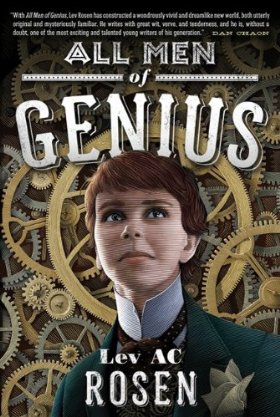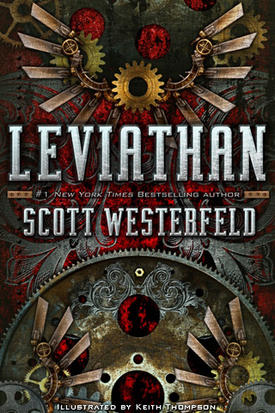
Mechanique: A Tale of the Circus Tresaulti
by GeneValentine
"Ladies and gentlemen," she calls. Her voice fills the air. It feels as if the tent grows to accommodate the words, the circle of benches pushing out and out, the tinny Panadrome swelling to an orchestra, the light softening and curling around the shadows, until all at once you are perched on a tiny wooden seat above a vast and glorious stage. The woman's arms are still thrown wide, and you realize she has not paused, that her voice alone has changed the air, and when she goes on, "Welcome to the Circus Tresaulti!" you applaud like your life depends on it, without knowing why.
The Circus Tresaulti has been traveling for a long time, watching wars waged, regimes fall, and new corrupt ones rise. Sometimes they come across a town that seems familiar, but it is an old ruin, so it couldn't have been the town they visited before, could it?
The performers have been with the show for an age (or maybe a few). There are some who come and go like mayflies, but others choose to be augmented by the Boss, and they stay forever. The Boss gives them new hollow bones (the aerialists) or massive gears in their back (the strong man), or, only once, a set of singing wings. They are tied together tighter than family, tighter than blood. They know every gesture, every molecule of each other; they hate it, they love it, and they would die for it.
I must admit I started out not liking this book. It felt like faded footage of a circus: you got to observe, but never touch, never delve. The narrator was uninteresting. Then, about halfway through the book, shit hits the fan, when the government man comes to the circus. Suddenly, secrets that you kind of knew, but didn't really, explode in your face, and there are dark revelatory flashbacks and loyalties are tested to the breaking point.
The book feels very post-modern, switching perspectives from first to third person, or maybe you are still in the head of the first person but he happens to know everything in retrospect? Its confusing for a while, and then you just stop caring and go along for the ride.
Valentine is the master of the subtle essential detail. She will drop a tiny sentence at the end of a scene that changes the game completely, though you may not know it until a few chapters later.
For a while, the performers seem a bit crazy, like bitchy Elena who may or may not have let someone fall from the trapeze on purpose, the beautiful Winged Man who may or may not have committed suicide, Stenos the acrobat who hates his partner to the point of obsessive devotion, Bird, the ex-soldier, who will do anything to have the wings. But as you marinate in their lives, you begin to see why this all emotionally, if not intellectually, makes sense.
The most compelling character is that of the Boss. She (yes, she), is the ringmaster, the creator of the circus, the mother of all. Her word is law, and in many scenes she seems invincible, but the revelations of her vulnerability are the most resonant parts of the book.
And it has a slam bang, guns blazing, last-stand, everyone you loved is here for you but may die for you kind of ending. Makes me cry every time.
Its not set in any time period, or in all time periods, so I wouldn't call it steampunk, though for moments it has that feel. At other times, it seems like an ageless, more sympathetic Mother Courage and her Children.
I was lucky! This was a book I picked off the shelf for its cover as the library was closing.
Read this if you liked:
Dream of Perpetual Motion






















